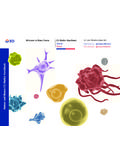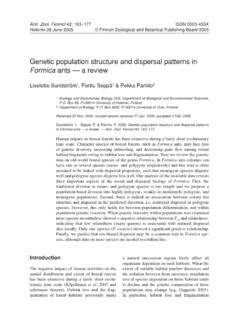Transcription of Targeted therapy against cytokines and …
1 Indian Journal of Basic and Applied Medical Research; March 2015: , Issue- 2, P. 465-475 P ISSN: 2250-284X , E ISSN : 2250-2858 465 Review article Targeted therapy against cytokines and chemokines in cancer 1Dr. Vaishali Verma , 2Dr. Jatinder Singh , 3Dr. Amarjit Singh, 4Dr. Jasmine Chug 1 Junior resident, Pathology Department , Government Medical College, Amritsar ,Punjab 2 Additional Professor, Pharmacology, Government Medical College, Amritsar ,Punjab 3 Professor and Head, Pathology Department, Government Medical College, Amritsar, Punjab 4 Junior resident, Pathology Department, Government Medical College, Amritsar, Punjab Name of the Institute/college: Government Medical College, Amritsar, Punjab Corresponding author: Verma Abstract: cytokines are a diverse group of non-antibody proteins that act as mediators between mediate & regulate amplitude and duration of immune & inflammatory are important specifically in host responses to infection, immune responses, inflammation, trauma, sepsis, cancer, and reproduction.
2 The interaction between cytokines & chemokines and their receptors forms a network at tumour site responsible for tumour progression and induction of anti tumour responses and tumour rejection. These affect multiple pathways of tumour progression including leucocyte recruitment, cellular scenescence, tumour cell proliferation & survival, angiogenesis, invasion and metastasis. These also have role in cancer cachexia, act as anti tumour agents and as prognostic markers. Cytokine therapy is given to manipulate the immune response in such a way as to generate the appropriate immune effector cells to eradicate various solid have been clinical trials executed involving the administration of interferon-gamma, interferon-alpha, interleukin-2, tumor necrosis factor-alpha, and Interleukin-12. Cytokine-based anticancer agents and antagonists to chemokines possess high potential for the development of therapeutic agents to treat various types of malignant cancer.
3 Important ones are Aldesleukin, Sunitinib, Bevacizumab, Maraviroc and many more. Future applications of cytokine therapy may involve a combination of cytokines in the treatment of advanced malignancies. In particular, the combination of IL-2 and IL-12 may prove to be the most effective regimen. Introduction cytokines are low molecular weight soluble proteins produced in response to microbes or other antigens. These are small cell-signalling protein molecules secreted by cells of immune system involved extensively in intercellular communications. These mediate and regulate amplitude and duration of immune and inflammatory responses. Categories of cytokines are Interferon, Interleukins, Tumour necrosis factor, Transforming growth factor, Colony stimulating factor, Growth factors. They play main role in hematopoiesis (CSF), inflammatory reaction (IL-1,TNF), chemotaxis (IL-8, MIP-1), immu-nostimulation (IL-12,IFN- ), suppression (IL-10), angiogenesis (VEGF) and embryogenesis (TGF- ).
4 Indian Journal of Basic and Applied Medical Research; March 2015: , Issue- 2, P. 465-475 P ISSN: 2250-284X , E ISSN : 2250-2858 466 Name Source Function (IFN) INF by leucocytes INF by fibroblasts INF by NKcells,Th1 cells,CD 8 T cells IFN- & increase MHC-1 expression on viral infected cells helping their recognition by CD8 T-cells & increase cytotoxic action of NK cells IFN- activates macrophages and promotes production of Th1 (IL) Helper CD4+ T lymphocytes & also by monocytes, macrophages & endothelial cells. Promote development & differentiation of T,B and haematopoietic cells Necrosis Factor (TNF) Macrophages,CD4 lymphocytes,NK cells, mast cells, TNF- implicated in tumour regression, septic shock & pyrogen, causes fever by direct action or by stimulation of IL-1 secretion TNF- cytotoxic for wide range of tumour cells in vivo & in vitro.
5 Various cytokines & their functions: Indian Journal of Basic and Applied Medical Research; March 2015: , Issue- 2, P. 465-475 P ISSN: 2250-284X , E ISSN : 2250-2858 467 Also includes FasL, CD30L and TNF-related apoptosis inducing ligand (TRAIL). Growth Factor (TGF) Macrophages, brain cells, keratinocytes TGF- induces epithelial development. TGF- plays a role in tissue regeneration, cell differentiation & regulation of immune in some human cancers. Stimulating Factor (CSF) macrophages, T cells, mast cells, endothelial cells & fibroblasts Activates intracellular signaling cells to proliferate & differentiate into a specific kind of blood cell (usually leucocyte).GM-CSF functions as a WBC growth factor & stimulates stem cells to produce granulocytes and monocytes Indian Journal of Basic and Applied Medical Research; March 2015: , Issue- 2, P.
6 465-475 P ISSN: 2250-284X , E ISSN : 2250-2858 468 Chemokines Chemokines are a family of small (8-10 kDa) proteins that act as chemoattractants for specific type of leucocytes. These are classified into 4 major groups according to arrangement of conserved cysteine (C) residues in major chemokines ( ) have 1 amino acid residue separating the first two conserved cysteine residues. These act primarily on neutrophils .Eg. chemokines ( ) have the first two conserved cysteine residues adjacent. Eg. Monocyte chemoattractant protein (MCP), eotaxin, Macrophage inflammatory protein (MIP-1 ) & RANTES (regulated & normal T cell expressed & secreted).
7 C chemokines ( ) lack two(1st and 3rd ) of the four conserved Lymphotactin relatively specific for lymphocytes. CX C chemokines contain 3 amino acids between two cysteines. cytokines & chemokines in cancer : The tumour microenvironment consists of a variable combination of tumour cells,stromal Factors (PDGF,EGF,FGF, VEGF) Fibroblasts,endothelial cells,platelets, macro- Phages,keratinocytes typically act as signalling molecules between Bone Morphogenetic Proteins(BMPs), Epidermal Growth Factor (EGF),Erythropoietin(EPO),Thrombopoietin (TPO) & Platelet Derived Growth Factor (PDGF).BMPs stimulate bone cell differentiation while FGF & VEGF stimulate angiogenesis. Indian Journal of Basic and Applied Medical Research; March 2015: , Issue- 2, P.
8 465-475 P ISSN: 2250-284X , E ISSN : 2250-2858 466 fibroblasts,endothelial cells and infiltrating leucocytes such as macrophages, T lymphocytes and dendritic variety of cytokines , chemokines and growth factors are produced in the local tumour environment by different interaction between cytokines , chemokines, growth factors and their receptors form a comprehensive network at tumour site which is responsible for tumour progression and induction of anti tumour responses and tumour rejection2. cytokines that are produced in response to infection, inflammation and immunity can function to inhibit tumour development and progression. Also, cancer cells can respond to host derived cytokines that promote growth, attenuate apoptosis and facilitate invasion and Role in tumour progression Inflammation is the key component of tumour microenvironment and it has been proposed to represent 7th hallmark of cancer 4.
9 Chemokines are also part of the network of inflammatory mediators associated with neoplasia irrespective of affect multiple pathways of tumour progression including leucocyte recruitment, cellular scenescence, tumour cell proliferation & survival , angiogenesis and invasion and metastasis. Chemokines modulate tumour behaviour by three important mechanisms: regulation of tumour-associated angiogenesis, activation of a host tumour-specific immunological response, and direct stimulation of tumour cell proliferation in an autocrine fashion6. All of these mechanisms are promising points of cancer suggests that chemokine antagonists could be important in development of new anti cancer therapies. A. cytokines Inflammation ROS,RNI Epigenetic mechanisms Mutations Tumour Initiation 469 Indian Journal of Basic and Applied Medical Research; March 2015: , Issue- 2, P.
10 465-475 P ISSN: 2250-284X , E ISSN : 2250-2858 466 B. Tumor cells, Macrophages, Dendritic cells cytokines Chemokines Premalignant cells and other cell types Survival Proliferation Growth Angiogenesis Invasion Role of inflammation in tumour initiation and promotion A) Tumor initiation. Reactive oxygen species (ROS) and reactive nitrogen intermediates (RNI) produced by inflammatory cells may cause mutations in neighboring epithelial cells. Also, cytokines produced by inflammatory cells can elevate intracellular ROS and RNI in pre-malignant cells. In addition, inflammation can result in epigenetic changes that favor tumor initiation.














